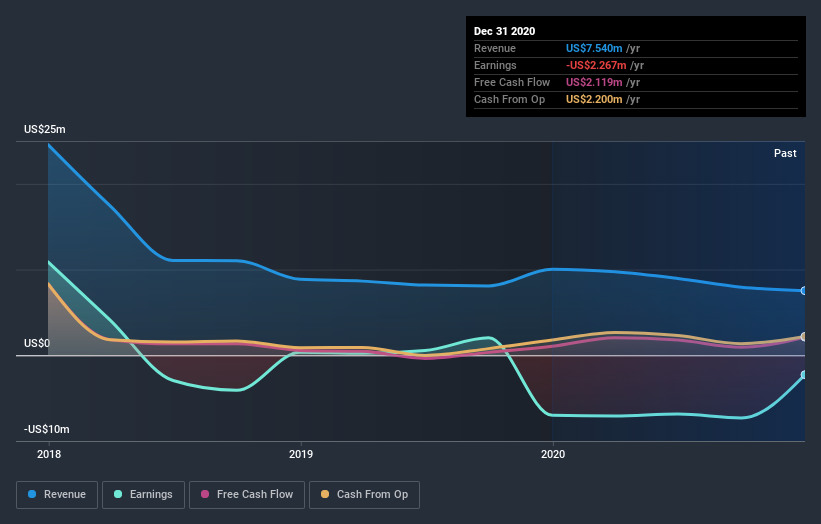What Kind Of Shareholders Hold The Majority In Maui Land & Pineapple Company, Inc.'s (NYSE:MLP) Shares?
The big shareholder groups in Maui Land & Pineapple Company, Inc. (NYSE:MLP) have power over the company. Large companies usually have institutions as shareholders, and we usually see insiders owning shares in smaller companies. I quite like to see at least a little bit of insider ownership. As Charlie Munger said 'Show me the incentive and I will show you the outcome.
Maui Land & Pineapple Company is not a large company by global standards. It has a market capitalization of US$222m, which means it wouldn't have the attention of many institutional investors. In the chart below, we can see that institutional investors have bought into the company. Let's delve deeper into each type of owner, to discover more about Maui Land & Pineapple Company.
See our latest analysis for Maui Land & Pineapple Company
What Does The Institutional Ownership Tell Us About Maui Land & Pineapple Company?
Institutional investors commonly compare their own returns to the returns of a commonly followed index. So they generally do consider buying larger companies that are included in the relevant benchmark index.
Maui Land & Pineapple Company already has institutions on the share registry. Indeed, they own a respectable stake in the company. This can indicate that the company has a certain degree of credibility in the investment community. However, it is best to be wary of relying on the supposed validation that comes with institutional investors. They too, get it wrong sometimes. If multiple institutions change their view on a stock at the same time, you could see the share price drop fast. It's therefore worth looking at Maui Land & Pineapple Company's earnings history below. Of course, the future is what really matters.
Maui Land & Pineapple Company is not owned by hedge funds. Stephen Case is currently the company's largest shareholder with 62% of shares outstanding. This implies that they have majority interest control of the future of the company. For context, the second largest shareholder holds about 5.7% of the shares outstanding, followed by an ownership of 3.3% by the third-largest shareholder. Furthermore, CEO Warren Haruki is the owner of 2.3% of the company's shares.
While studying institutional ownership for a company can add value to your research, it is also a good practice to research analyst recommendations to get a deeper understand of a stock's expected performance. We're not picking up on any analyst coverage of the stock at the moment, so the company is unlikely to be widely held.
Insider Ownership Of Maui Land & Pineapple Company
The definition of an insider can differ slightly between different countries, but members of the board of directors always count. Company management run the business, but the CEO will answer to the board, even if he or she is a member of it.
I generally consider insider ownership to be a good thing. However, on some occasions it makes it more difficult for other shareholders to hold the board accountable for decisions.
Our information suggests that insiders own more than half of Maui Land & Pineapple Company, Inc.. This gives them effective control of the company. So they have a US$146m stake in this US$222m business. Most would argue this is a positive, showing strong alignment with shareholders. You can click here to see if those insiders have been buying or selling.
General Public Ownership
With a 11% ownership, the general public have some degree of sway over Maui Land & Pineapple Company. While this size of ownership may not be enough to sway a policy decision in their favour, they can still make a collective impact on company policies.
Next Steps:
While it is well worth considering the different groups that own a company, there are other factors that are even more important. Take risks for example - Maui Land & Pineapple Company has 1 warning sign we think you should be aware of.
Of course this may not be the best stock to buy. So take a peek at this free free list of interesting companies.
NB: Figures in this article are calculated using data from the last twelve months, which refer to the 12-month period ending on the last date of the month the financial statement is dated. This may not be consistent with full year annual report figures.
This article by Simply Wall St is general in nature. It does not constitute a recommendation to buy or sell any stock, and does not take account of your objectives, or your financial situation. We aim to bring you long-term focused analysis driven by fundamental data. Note that our analysis may not factor in the latest price-sensitive company announcements or qualitative material. Simply Wall St has no position in any stocks mentioned.
Have feedback on this article? Concerned about the content? Get in touch with us directly. Alternatively, email editorial-team (at) simplywallst.com.


